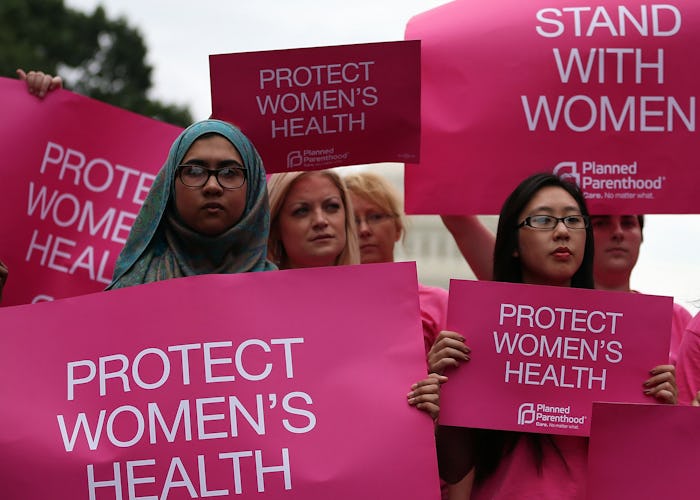News

Here's What's Wrong With Indiana's New Abortion Law
Indiana, the home state of Vice President Mike Pence, is all about testing out incredibly restrictive abortion laws in the name of seeing what sticks. This week, the state legislature passed a law that would require doctors to report a woman's abortion history to the state every year and it's been signed by the governor. However, it's entirely possible that Indiana's newest abortion law will be challenged in court, much like a lot of other restrictive abortion laws.
Indiana Gov. Eric Holcomb signed a law on Monday, as reported by The Hill, that would require doctors to file a report on their patients listing possible "complications from abortion." Beginning July 1, a woman's primary care provider would have to submit a tally of all of the complications from abortion, which could include hemorrhaging or blood clots. Mental health conditions, like depression or anxiety, would also have to be reported. As reported in The Hill, doctors would have to ask a woman about how many times they've terminated a pregnancy, the date of the procedure, the name of the facility where it was done, along with other demographic information about the patient. If a doctor refuses to comply, they could be put in jail, according to the Associated Press.
Basically, every time a woman went to the doctor, she'd be asked if she's ever terminated a pregnancy and if she had, she'd then have to give her health care professional the details. This is an unnecessary rule that only serves to perpetuate one of the most prevalent myths about abortion — that it is dangerous. Indiana's American Civil Liberties Union director of advocacy, Katie Blair, told the Associated Press, "It seems like our Legislature's dead set on passing radical abortion restrictions every single year."
Indiana state Rep. Sue Errington told the Indy Star essentially the same, saying, "It seems to me that this is an attempt to make this appear like a dangerous procedure, and it's not."
A study released earlier this month by the National Academies of Sciences, Engineering and Medicine found that abortions are safe and effective. If anything, it's restrictive abortion laws that make women wait to get them done that increase chances of medical issues. Hal Lawrence, the CEO of the American College of Obstetricians and Gynecologists (ACOG), said in a statement after the report was released:
Those sorts of laws have been totally debunked. Abortion is safer when it's performed earlier in gestation. And so delaying and making people wait and go through hoops of unnecessary, extra procedures does not improve the safety. And actually by having them delay can actually worsen the safety.
There is no link between fertility and abortions, or abortions and negative mental health outcomes as reported by Self and The New York Times, respectively. Nor is there a link between abortion and breast cancer, according to the American Cancer Society. All of these "complications" have been debunked. Indiana's new law essentially forces doctors and the one in four women who get an abortion, according to the Guttmacher Institute, to pretend that any of those health conditions are linked to a past abortion. When, just because it bears repeating, the rates of "abortion complications" are very, very low, again according to the most recent and comprehensive study done on abortion complications released earlier this month by the National Academies of Sciences, Engineering and Medicine and a 2014 study done by the University of California in San Francisco.
The ACLU in Indiana is, according to the Associated Press, looking into suing the state to block the law from going into effect. The ACLU has previously been successful in getting judges to declare Indiana's targeted restrictions on abortion providers, (or TRAP laws as they're most commonly known), illegal, such as the one Pence signed when he was governor requiring women to bury medical waste from an abortion or miscarriage. Or another law that made it difficult for minors to get an abortion.
However, 27 states require doctors to report post-abortion complications, according to the Guttmacher Institute, so it might be deemed legal, even though it perpetuates bad science and further stigmatizes abortion. But it's not just that the law forces doctors to pretend that abortions are dangerous. For one, it's easy to imagine a world in which legislators would push to close clinics if there was even one adverse effect of an abortion.
Luckily, President Donald Trump has since walked back his 2016 debate statement that women should be "punished" for legally terminating their pregnancies. But it's not out of line to suggest that targeting women and abortion providers, in an effort to eventually end legal abortion once and for all, is one main goal of the administration. Even though research shows abortion restrictions put women's lives at risk.
But this administration and its supporters have historically supported legal ramifications for women and their advocates who get abortions, like a proposed Texas law that would jail people who gave women rides to an abortion clinic, which are few and far between enough as it is. Again, Pence has built a political career both in the U.S. House of Representatives and as Indiana governor supporting anti-choice legislation.